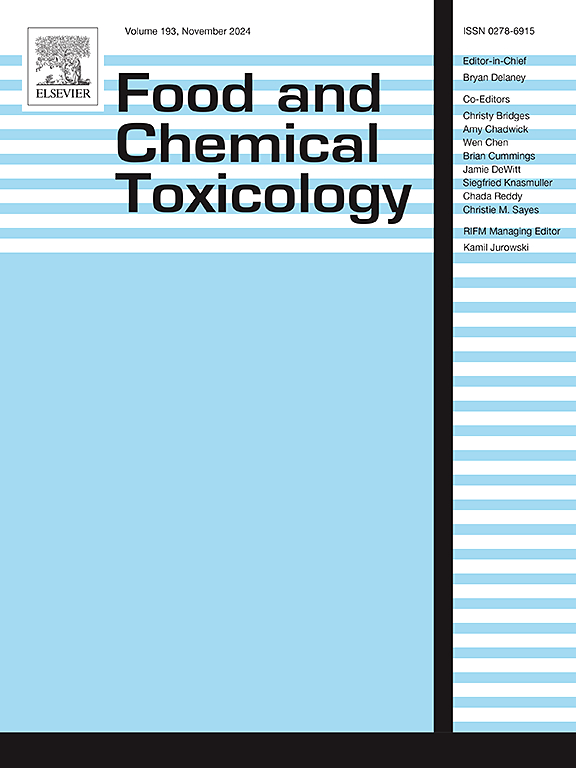香槟酒。根提取物通过调节小鼠肠道微生物群来缓解穷尽性疲劳。
IF 3.9
3区 医学
Q2 FOOD SCIENCE & TECHNOLOGY
引用次数: 0
摘要
背景:耗尽性疲劳已成为人们普遍关注的问题,使用天然活性成分作为益生元已成为缓解疲劳的前瞻性策略。香槟酒。根(MS)具有抗疲劳活性,但其抗疲劳作用与肠道菌群的关系尚不清楚。目的:探讨MS提取物的抗疲劳作用与肠道菌群的关系。方法:用水和乙醇提取质谱,得到质谱水提取物(MSW)和质谱乙醇提取物(MSE)。将60只ICR小鼠分为对照组、西洋参组、低、高剂量生活垃圾组和低、高剂量MSE组,持续28 d。分析疲劳相关生化指标及盲肠内容物肠道菌群。结果:MSW和MSE能有效延长小鼠游泳时间和攀爬时间,降低有害代谢物,增加肝脏和肌肉中糖原含量,减轻氧化应激损伤。此外,MSW和MSE可以恢复EF诱导的肠道菌群失调,包括有益菌的富集和有害菌的消耗。结论:MS提取物可通过提高小鼠运动耐力、降低氧化应激、调节肠道菌群稳态等途径有效缓解EF。因此,MS提取物可作为改善EF的益生元制剂。本文章由计算机程序翻译,如有差异,请以英文原文为准。
Millettia speciosa Champ. root extracts relieve exhaustive fatigue by regulating gut microbiota in mice
Background
Exhaustive fatigue (EF) has become a common concern, and using natural active ingredients as prebiotics has become prospective strategy for fatigue alleviation. Millettia speciosa Champ. root (MS) has anti-fatigue activity, but the relationship between MS anti-fatigue effect and gut microbiota remains unclear.
Purpose
To investigate the relationship between anti-fatigue effect of MS extracts and gut microbiota.
Methods
MS was extracted with water and ethanol to obtain MS water extract (MSW) and MS ethanol extract (MSE). Sixty ICR mice were divided into six groups: Control, American ginseng, low-, high-doses MSW and low-, high-doses MSE for 28 days. Fatigue related biochemical indexes and gut microbiota of cecum contents were analyzed.
Results
MSW and MSE effectively prolonged swimming time and climbing time in mice, decreased harmful metabolites, increased the glycogen content in the liver and muscle, and reduced oxidative stress damage. Furthermore, the dysbiosis of gut microbiota induced by EF was restored by MSW and MSE, including enriching beneficial bacteria and depleting harmful bacteria.
Conclusion
The results suggested that MS extracts may effectively alleviate EF though improving exercise endurance, reducing oxidative stress and regulating gut microbiota homeostasis in mice. Therefore, MS extracts may be considered as a prebiotic agent to improve EF.
求助全文
通过发布文献求助,成功后即可免费获取论文全文。
去求助
来源期刊

Food and Chemical Toxicology
工程技术-毒理学
CiteScore
10.90
自引率
4.70%
发文量
651
审稿时长
31 days
期刊介绍:
Food and Chemical Toxicology (FCT), an internationally renowned journal, that publishes original research articles and reviews on toxic effects, in animals and humans, of natural or synthetic chemicals occurring in the human environment with particular emphasis on food, drugs, and chemicals, including agricultural and industrial safety, and consumer product safety. Areas such as safety evaluation of novel foods and ingredients, biotechnologically-derived products, and nanomaterials are included in the scope of the journal. FCT also encourages submission of papers on inter-relationships between nutrition and toxicology and on in vitro techniques, particularly those fostering the 3 Rs.
The principal aim of the journal is to publish high impact, scholarly work and to serve as a multidisciplinary forum for research in toxicology. Papers submitted will be judged on the basis of scientific originality and contribution to the field, quality and subject matter. Studies should address at least one of the following:
-Adverse physiological/biochemical, or pathological changes induced by specific defined substances
-New techniques for assessing potential toxicity, including molecular biology
-Mechanisms underlying toxic phenomena
-Toxicological examinations of specific chemicals or consumer products, both those showing adverse effects and those demonstrating safety, that meet current standards of scientific acceptability.
Authors must clearly and briefly identify what novel toxic effect (s) or toxic mechanism (s) of the chemical are being reported and what their significance is in the abstract. Furthermore, sufficient doses should be included in order to provide information on NOAEL/LOAEL values.
 求助内容:
求助内容: 应助结果提醒方式:
应助结果提醒方式:


